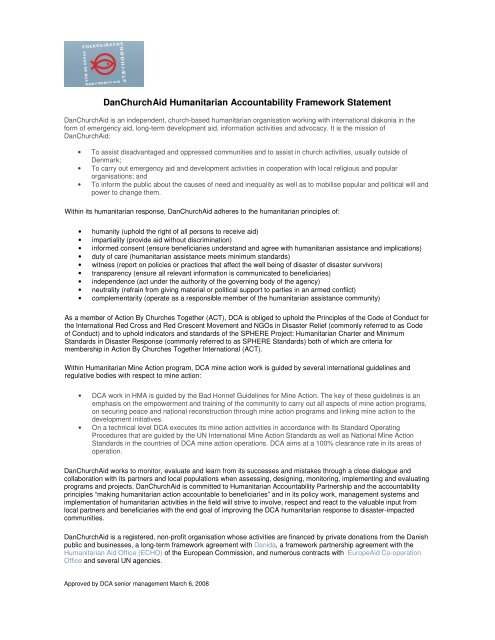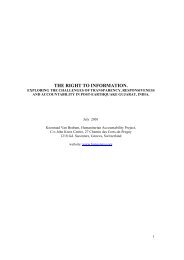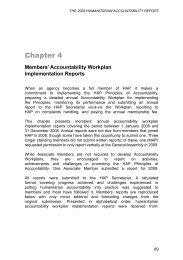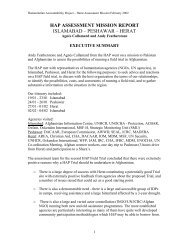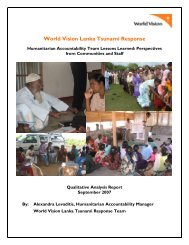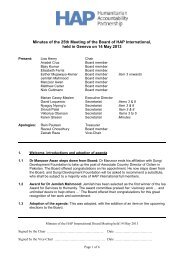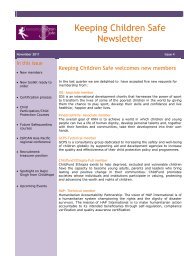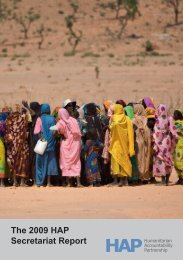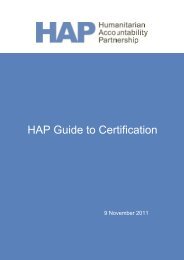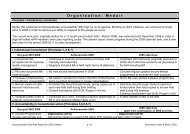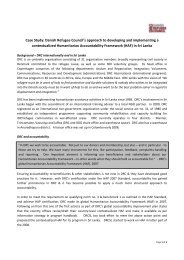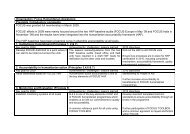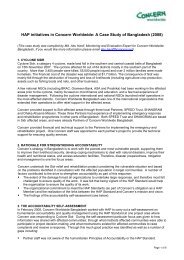DCA Humanitarian Accountability Framework - HAP International
DCA Humanitarian Accountability Framework - HAP International
DCA Humanitarian Accountability Framework - HAP International
You also want an ePaper? Increase the reach of your titles
YUMPU automatically turns print PDFs into web optimized ePapers that Google loves.
DanChurchAid <strong>Humanitarian</strong> <strong>Accountability</strong> <strong>Framework</strong> Statement<br />
DanChurchAid is an independent, church-based humanitarian organisation working with international diakonia in the<br />
form of emergency aid, long-term development aid, information activities and advocacy. It is the mission of<br />
DanChurchAid:<br />
• To assist disadvantaged and oppressed communities and to assist in church activities, usually outside of<br />
Denmark;<br />
• To carry out emergency aid and development activities in cooperation with local religious and popular<br />
organisations; and<br />
• To inform the public about the causes of need and inequality as well as to mobilise popular and political will and<br />
power to change them.<br />
Within its humanitarian response, DanChurchAid adheres to the humanitarian principles of:<br />
• humanity (uphold the right of all persons to receive aid)<br />
• impartiality (provide aid without discrimination)<br />
• informed consent (ensure beneficiaries understand and agree with humanitarian assistance and implications)<br />
• duty of care (humanitarian assistance meets minimum standards)<br />
• witness (report on policies or practices that affect the well being of disaster of disaster survivors)<br />
• transparency (ensure all relevant information is communicated to beneficiaries)<br />
• independence (act under the authority of the governing body of the agency)<br />
• neutrality (refrain from giving material or political support to parties in an armed conflict)<br />
• complementarity (operate as a responsible member of the humanitarian assistance community)<br />
As a member of Action By Churches Together (ACT), <strong>DCA</strong> is obliged to uphold the Principles of the Code of Conduct for<br />
the <strong>International</strong> Red Cross and Red Crescent Movement and NGOs in Disaster Relief (commonly referred to as Code<br />
of Conduct) and to uphold indicators and standards of the SPHERE Project: <strong>Humanitarian</strong> Charter and Minimum<br />
Standards in Disaster Response (commonly referred to as SPHERE Standards) both of which are criteria for<br />
membership in Action By Churches Together <strong>International</strong> (ACT).<br />
Within <strong>Humanitarian</strong> Mine Action program, <strong>DCA</strong> mine action work is guided by several international guidelines and<br />
regulative bodies with respect to mine action:<br />
• <strong>DCA</strong> work in HMA is guided by the Bad Honnef Guidelines for Mine Action. The key of these guidelines is an<br />
emphasis on the empowerment and training of the community to carry out all aspects of mine action programs,<br />
on securing peace and national reconstruction through mine action programs and linking mine action to the<br />
development initiatives.<br />
• On a technical level <strong>DCA</strong> executes its mine action activities in accordance with its Standard Operating<br />
Procedures that are guided by the UN <strong>International</strong> Mine Action Standards as well as National Mine Action<br />
Standards in the countries of <strong>DCA</strong> mine action operations. <strong>DCA</strong> aims at a 100% clearance rate in its areas of<br />
operation.<br />
DanChurchAid works to monitor, evaluate and learn from its successes and mistakes through a close dialogue and<br />
collaboration with its partners and local populations when assessing, designing, monitoring, implementing and evaluating<br />
programs and projects. DanChurchAid is committed to <strong>Humanitarian</strong> <strong>Accountability</strong> Partnership and the accountability<br />
principles “making humanitarian action accountable to beneficiaries” and in its policy work, management systems and<br />
implementation of humanitarian activities in the field will strive to involve, respect and react to the valuable input from<br />
local partners and beneficiaries with the end goal of improving the <strong>DCA</strong> humanitarian response to disaster-impacted<br />
communities.<br />
DanChurchAid is a registered, non-profit organisation whose activities are financed by private donations from the Danish<br />
public and businesses, a long-term framework agreement with Danida, a framework partnership agreement with the<br />
<strong>Humanitarian</strong> Aid Office (ECHO) of the European Commission, and numerous contracts with EuropeAid Co-operation<br />
Office and several UN agencies.<br />
Approved by <strong>DCA</strong> senior management March 6, 2008
Quality and <strong>Accountability</strong><br />
Commitments<br />
Commitments Authority Obligation<br />
DanChurchAid <strong>Humanitarian</strong> <strong>Accountability</strong> <strong>Framework</strong><br />
Baseline analysis<br />
How do we make<br />
sure staff know?<br />
(Implementation<br />
mechanism)<br />
<strong>DCA</strong> Mandate/charter Council Binding <strong>DCA</strong> Vision and<br />
Plan2006-2010<br />
How do we<br />
make sure<br />
partners<br />
know?<br />
(Partner status)<br />
<strong>DCA</strong> Annual<br />
reports<br />
<strong>DCA</strong> website<br />
Partner<br />
consultations<br />
Core group<br />
What has to be<br />
improved so we<br />
actually do what<br />
we say we are<br />
doing?<br />
(Compliance Status)<br />
<strong>DCA</strong> HQ and<br />
<strong>DCA</strong> RR staff<br />
involved in V and<br />
P development,<br />
implementation<br />
and reporting.<br />
Bi-annual<br />
reporting to <strong>DCA</strong><br />
Board.<br />
Implementation Plan<br />
What do we<br />
want to achieve<br />
in a given<br />
amount of<br />
time?<br />
(SMART<br />
Objective)<br />
Ownership and<br />
appreciation<br />
among <strong>DCA</strong><br />
staff on <strong>DCA</strong><br />
mandate/charter;<br />
in particular<br />
focus and<br />
coherence<br />
How do you<br />
measure that<br />
progress?<br />
(Progress Indicator)<br />
Policies and<br />
practices across the<br />
organisation,<br />
(national and<br />
internationally)<br />
reflect and are in line<br />
with the mandate and<br />
are adjusted<br />
according to joint<br />
learnings<br />
Action to be taken to reach goals.<br />
Board and senior management communicate<br />
clearly overall directions and ensure joint<br />
participatory planning processes at various levels<br />
in the organisations.<br />
<strong>DCA</strong> Programme<br />
Policy: <strong>Humanitarian</strong><br />
Assistance<br />
Relief<br />
Director<br />
Binding<br />
Inclusive process of<br />
<strong>Humanitarian</strong><br />
Assistance Policy<br />
development and<br />
dissemination<br />
worldwide.–<br />
Regional<br />
Representatives<br />
ensure <strong>DCA</strong> staff<br />
work within the<br />
frame of the policy<br />
in interaction with<br />
partners<br />
Knowledge, Attitude<br />
and Practice (KAP)<br />
study<br />
Meetings/<br />
consultations<br />
with partners<br />
ACT Forum<br />
Dialogue during<br />
project design<br />
<strong>DCA</strong> web-site<br />
Knowledge,<br />
Attitude and<br />
Practice (KAP)<br />
Study<br />
Toolbox in support<br />
of policy fully<br />
developed and<br />
available on<br />
intranet<br />
Consistent filing of<br />
relief project<br />
documents on the<br />
intranet<br />
Regional offices<br />
and HQ Unit’s<br />
work plans reflect<br />
objective.<br />
Annual follow up<br />
on relevance and<br />
consistent use of<br />
policy with<br />
relevant staff<br />
(PDU spot checks)<br />
Policy and<br />
toolbox known<br />
and actively in<br />
use by staff to<br />
support<br />
interaction with<br />
partners<br />
Projects in line<br />
with policies<br />
<strong>DCA</strong> internal QA<br />
procedures (relief<br />
PPM)<br />
Project Reviews and<br />
Evaluations<br />
Observations from<br />
partner visits and<br />
fields trips<br />
1.<strong>Humanitarian</strong> Assistance Policy updated and<br />
approved in Feb 2008. (PDU/RCU)<br />
2. Rolled out throughout 2008 (PDU/RCU)<br />
3.Division of responsibilities between<br />
Programme Development Unit. and Relief<br />
Coordination Unit and Regional Offices clarified<br />
and adopted at annual meeting April 2008<br />
4.Relief PME tools developed and disseminated<br />
in 2008-2009.<br />
5. KAP study undertaken early 2009<br />
6. Capacity building of all <strong>DCA</strong> relief officer and<br />
relief related staff (2007-2010)
Quality and <strong>Accountability</strong><br />
Commitments<br />
Commitments Authority Obligation<br />
Red Cross & NGO<br />
Code of Conduct<br />
Sphere <strong>Humanitarian</strong><br />
Charter and Minimum<br />
Standards<br />
Relief<br />
Director<br />
Relief<br />
Director<br />
Binding<br />
Binding<br />
DanChurchAid <strong>Humanitarian</strong> <strong>Accountability</strong> <strong>Framework</strong><br />
Baseline analysis<br />
How do we make<br />
sure staff know?<br />
(Implementation<br />
mechanism)<br />
Staff manual<br />
Annual<br />
training/refresher<br />
course<br />
Relief Tool Box<br />
Regional<br />
Representatives<br />
ensure <strong>DCA</strong> staff<br />
actively use CoC in<br />
interaction with<br />
partners<br />
Knowledge, Attitude<br />
and Practice (KAP)<br />
study<br />
Staff manual<br />
<strong>Humanitarian</strong><br />
Assistance Policy<br />
Quality Assessment<br />
process<br />
Regional<br />
Representatives<br />
ensure <strong>DCA</strong> staff<br />
actively use Sphere<br />
Standards in<br />
interaction with<br />
partners<br />
Knowledge, Attitude<br />
and Practice (KAP)<br />
study<br />
How do we<br />
make sure<br />
partners<br />
know?<br />
(Partner status)<br />
ACT forum<br />
discussions<br />
Partner<br />
consultations<br />
Partner<br />
cooperation<br />
agreements<br />
Knowledge,<br />
Attitude and<br />
Practice (KAP)<br />
Assessment<br />
ACT forum<br />
discussions<br />
Partner<br />
consultations<br />
Partner<br />
cooperation<br />
agreements,<br />
<strong>DCA</strong> monitoring<br />
plan attached<br />
Knowledge,<br />
Attitude and<br />
Practice (KAP)<br />
Assessment<br />
What has to be<br />
improved so we<br />
actually do what<br />
we say we are<br />
doing?<br />
(Compliance Status)<br />
Consistent<br />
reference to CoC<br />
in project<br />
monitoring and<br />
other partner<br />
interaction.<br />
CoC visible at<br />
regional offices<br />
Consistent<br />
reference to<br />
Sphere in relief<br />
assessment,<br />
monitoring and<br />
evaluation.<br />
Sphere handbook<br />
visible at regional<br />
offices/on field<br />
visits<br />
Implementation Plan<br />
What do we<br />
want to achieve<br />
in a given<br />
amount of<br />
time?<br />
(SMART<br />
Objective)<br />
<strong>DCA</strong> staff<br />
improved own<br />
knowledge and<br />
interaction with<br />
<strong>DCA</strong> relief<br />
partners on the<br />
Red Cross and<br />
NGO Code of<br />
Conduct<br />
<strong>DCA</strong> staff<br />
improved own<br />
knowledge and<br />
interaction with<br />
<strong>DCA</strong> strategic<br />
relief partners<br />
on SPHERE<br />
standards.<br />
How do you<br />
measure that<br />
progress?<br />
(Progress Indicator)<br />
<strong>DCA</strong> internal QA<br />
procedures (relief<br />
PPM)<br />
Reviews and<br />
evaluations<br />
Observations from<br />
partner visits and<br />
field trips<br />
<strong>DCA</strong> internal QA<br />
procedures (relief<br />
PPM)<br />
Reviews and<br />
evaluations<br />
Observations from<br />
partner visits and<br />
field trips<br />
Action to be taken to reach goals.<br />
KAP study undertaken early 2009.<br />
Training/refresher of <strong>DCA</strong> staff at Relief<br />
Workshop 2007-2010.<br />
Annual refresher training of <strong>DCA</strong> partner staff<br />
(locally available)<br />
.Revise Partner Cooperation Agreement to<br />
include Code of Conduct in 2008 (PDU)<br />
.<strong>DCA</strong> Quality Assessment process implemented<br />
for every application (2008)<br />
CoC visible (posters) at regional offices (2008)<br />
CoC discussed with partners during meetings and<br />
field visits (2007-2010).<br />
KAP study undertaken early 2009<br />
Training/refresher of <strong>DCA</strong> staff at Relief<br />
Workshop 2007-2010.<br />
Annual refresher training of <strong>DCA</strong> partner staff<br />
(2007-2010)<br />
Revise Partner Cooperation Agreement to<br />
include SPHERE in 2008 (PDU)<br />
<strong>DCA</strong> Quality Assessment process implemented<br />
for every application (2008)<br />
SPHERE visible (posters) at regional offices<br />
SPHERE discussed with partners at meetings and<br />
field visits (2007-2010)
Quality and <strong>Accountability</strong><br />
Commitments<br />
Commitments Authority Obligation<br />
<strong>HAP</strong> Standard<br />
<strong>HAP</strong> benchmarks<br />
B1-Hum Quality<br />
Management System<br />
(V &P)<br />
B2-Information (<strong>DCA</strong><br />
publicize info to<br />
beneficiaries/public)<br />
B3-Participation<br />
(Project beneficiaries<br />
take part in decision<br />
making in projects)<br />
B4-Staff Performance<br />
(<strong>DCA</strong> staff<br />
competencies re<br />
accountability<br />
measured and<br />
improved)<br />
B5-Complaints<br />
Mechanism (Safe,<br />
accessible means for<br />
complaints handling<br />
for beneficiaries of<br />
<strong>DCA</strong> projects)<br />
B6-Improvement<br />
(<strong>DCA</strong> process for<br />
continual improvement<br />
in humanitarian<br />
response. V&P)<br />
Head of<br />
Programme<br />
Development<br />
Unit /Relief<br />
Director<br />
Binding<br />
DanChurchAid <strong>Humanitarian</strong> <strong>Accountability</strong> <strong>Framework</strong><br />
Baseline analysis<br />
How do we make<br />
sure staff know?<br />
(Implementation<br />
mechanism)<br />
<strong>Humanitarian</strong><br />
<strong>Accountability</strong><br />
project<br />
description/workplan<br />
disseminated to<br />
<strong>DCA</strong> staff.<br />
Regular update from<br />
Relief Director on<br />
development of -<br />
and progress on<br />
<strong>HAP</strong> process<br />
Designated staff<br />
(<strong>HAP</strong> dream team at<br />
the core)<br />
continuously<br />
highlight in all<br />
relevant situations<br />
purpose and<br />
importance of <strong>HAP</strong><br />
Knowledge, Attitude<br />
and Practice (KAP)<br />
study<br />
How do we<br />
make sure<br />
partners<br />
know?<br />
(Partner status)<br />
ACT forum<br />
discussions<br />
Partner<br />
consultations<br />
Knowledge,<br />
Attitude and<br />
Practice (KAP)<br />
Assessment<br />
What has to be<br />
improved so we<br />
actually do what<br />
we say we are<br />
doing?<br />
(Compliance Status)<br />
Consistent<br />
reference to <strong>HAP</strong><br />
in relief<br />
assessment,<br />
monitoring and<br />
evaluation.<br />
Regional office<br />
understanding<br />
improved and<br />
<strong>HAP</strong> internalised<br />
into project and<br />
office management<br />
Project documents<br />
timely uploaded.<br />
Implementation Plan<br />
What do we<br />
want to achieve<br />
in a given<br />
amount of<br />
time?<br />
(SMART<br />
Objective)<br />
<strong>DCA</strong> staff<br />
improved own<br />
knowledge and<br />
interaction with<br />
<strong>DCA</strong> relief<br />
partners.<br />
<strong>HAP</strong> principles<br />
internalised in<br />
<strong>DCA</strong><br />
procedures.<br />
How do you<br />
measure that<br />
progress?<br />
(Progress Indicator)<br />
<strong>DCA</strong> internal QA<br />
procedures (relief<br />
PPM)<br />
Reviews and<br />
evaluations<br />
Observations from<br />
partner visits and<br />
field trips<br />
<strong>DCA</strong> project<br />
monitoring plan<br />
attached to<br />
Cooperation<br />
Agreement<br />
Action to be taken to reach goals.<br />
1.Communication of <strong>DCA</strong> process to improve<br />
accountability to beneficiaries (LIH: 2007-2010)<br />
2. <strong>HAP</strong> subsite developed on <strong>DCA</strong> Intranet<br />
3. <strong>HAP</strong> framework and statement available on<br />
<strong>DCA</strong> English and Danish website<br />
4.Regional representatives publicize <strong>DCA</strong><br />
commitment to accountability (RR: 2008)<br />
5. Dialogue with strategic relief partners on<br />
accountability theme (RR 2008-2010)<br />
6.<strong>DCA</strong> Partner assessment formats (RR/Relief<br />
officers 2008-2010)<br />
7. <strong>HAP</strong> theme at ACT for a meetings worldwide<br />
(relief officers)<br />
8.<strong>HAP</strong> self assessments (RR + office annually<br />
9.Pilot complaints mechanism piloted in<br />
Malawi/Angola (LSH//Jakob: 2008)<br />
10.Complaints mechanism implemented in 2<br />
more countries Ethiopia/Cambodia 2009)<br />
11. Complaints mechanism implemented in 2<br />
more countries (2010 Sudan/Congo)<br />
12..Non-Disclosure Policy (MEmil)<br />
13..Anti-Corruption Policy (PBL)<br />
14.Spot checks from HQ (PDU/RCU)<br />
15.Quarterly “real time” learning (RCU) exercise<br />
on accountability challenges.<br />
16.Upload all relevant documents on Intranet<br />
(Relief officers)<br />
17. Job descriptions (GK)<br />
18. Central web-based complaints mechanism for<br />
<strong>DCA</strong> staff, beneficiaries and partners<br />
(established 2008)


